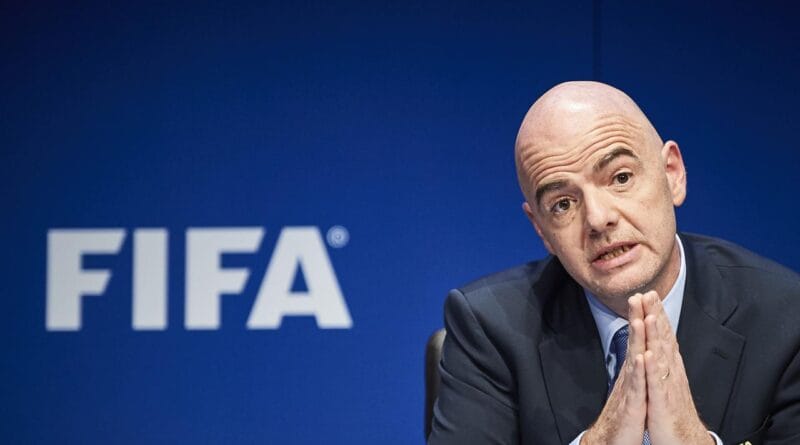Human rights groups slam decision, Saudi Arabia to host, reaction, details, background
FIFA confirmed that Saudi Arabia will host the 2034 World Cup, underlining the Gulf kingdom’s growing influence in world sport despite criticism of the country’s human rights record.
Watch selected NRL, AFL, SSN games plus every F1 qualifying session and race live in 4K on Kayo. New to Kayo? Get your first month for just $1. Limited time offer.

At the same time, a virtual Congress of world football’s governing body confirmed that Morocco, Spain and Portugal will be joint hosts of the 2030 World Cup, in which three games will also be played in South America.
The Saudi bid was waved through by acclamation during the meeting of FIFA’s 211 national member associations, with no rivals standing in its way.
“It is a proud day, a day of celebration, a day that we invite the entire world to Saudi Arabia,” said Abdulaziz bin Turki bin Faisal al Saud, the Saudi Minister of Sports.
“We intend to have an extraordinary version of the World Cup in our kingdom.”
However, there was immediate condemnation from rights groups who insisted that handing the organisation of the tournament to the country puts the lives of construction workers at risk and “marks a moment of great danger”.
FIFA had invoked its principle of rotating the World Cup between continents, which meant only bids from Asia or Oceania were welcome for 2034.
The unprecedented organisation of the 2030 tournament will involve three continental confederations in Europe, Africa and South America, while the next World Cup in 2026 — the first involving 48 teams — will take place across North America.
Controversially, the body gave potential bidders barely a month last year to submit candidacies, and Australia and Indonesia abandoned their interest.
That left Saudi Arabia as the sole candidate, clearing the way for the World Cup to return to the Gulf region so soon after Qatar hosted in 2022.
Liverpool stars offered new contracts | 01:24
The kingdom’s de facto ruler, Crown Prince Mohammed bin Salman, has been using sport for some time to amass influence and improve its global image — critics say he is effectively “sportswashing” by diverting attention from Saudi Arabia’s rights record.
The awarding of the World Cup to Saudi will make the issue of human rights a major talking point again, just as it was two years ago.
“We are inclusive and we are non-discriminatory, and we want to obtain positive social impact,” FIFA president Gianni Infantino said in closing remarks.
“We are of course aware of critics and fears, and I fully trust our hosts to address all open points from this process and deliver a FIFA World Cup which meets expectations.”
He added that “social improvements and positive human rights impacts” are “responsibilities of hosting a World Cup.”
Rights groups highlight mass executions in Saudi Arabia and allegations of torture, as well as restrictions on women under the conservative country’s male guardianship system. Free expression is severely restricted too.
FIFA’s decision to award the tournament to Saudi Arabia “despite the well-known and severe risks to residents, migrant workers and visiting fans alike, marks a moment of great danger,” Amnesty International and 20 other organisations said in a joint statement.
“Based on clear evidence to date, FIFA knows workers will be exploited and even die without fundamental reforms in Saudi Arabia, and yet has chosen to press ahead regardless,” said Steve Cockburn, Amnesty’s Head of Labour Rights and Sport.
Cockburn described FIFA’s decision to award the World Cup 2034 to Saudi Arabia as “reckless” and said it “will put many lives at risk”.
“The organisation risks bearing a heavy responsibility for many of the human-rights abuses that will follow,” he added.
“At every stage of this bidding process, FIFA has shown its commitment to human rights to be a sham. Meanwhile, its continued failure to compensate migrant workers who were exploited in Qatar provides scant confidence that lessons have been learned.
“FIFA must urgently change course and ensure that the World Cup is accompanied by wide-ranging reforms in Saudi Arabia, or risk a decade of exploitation, discrimination and repression connected to its flagship tournament.”
England’s Football Association meanwhile said it had received assurances from Saudi Arabia that LGBTQ fans would be “safe and welcome” at the tournament.
Are expectations too high for Ange? | 01:15
The 2030 tournament will mark a century since the first World Cup was held in Uruguay, and as a result the unrivalled joint bid by Morocco, Spain and Portugal will also see the South American nation handed one game along with Argentina and Paraguay.
FIFA confirmed over a year ago that the joint proposal led by Morocco, Spain and Portugal was the sole contender for 2030, with all other potential candidacies having fallen by the wayside.
Four South American countries launched a joint bid in 2019, convinced that the centenary World Cup should entirely take place on the continent where it all began.
Meanwhile, Morocco replaced Ukraine as a partner for Spain and Portugal, while South America agreed to step aside in exchange for hosting three games.
Following these “centenary celebrations” in the southern hemisphere winter, the six teams involved will cross the Atlantic to play the rest of the tournament.
Spain, which hosted the 1982 World Cup, should be the main host as it boasts 11 of the 20 proposed stadiums.
Morocco — after failing in five previous bids — will become the second African nation to host the competition after South Africa in 2010.
Potential venues for the July 21 final include the Santiago Bernabeu in Madrid and Barcelona’s renovated Camp Nou as well as the planned Hassan II stadium between Casablanca and Rabat, set to boast a 115,000 capacity.





